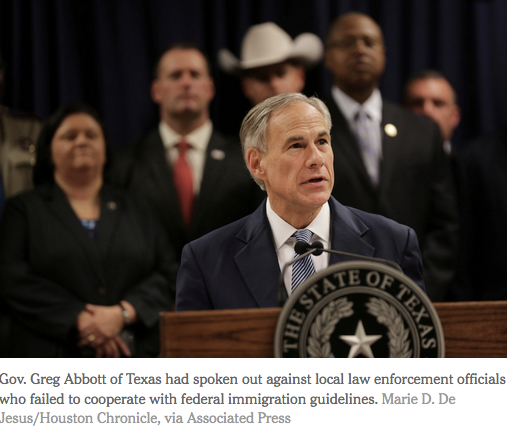Gov. Greg Abbott of Texas signed into law on Sunday a bill banning so-called sanctuary cities, a loosely defined term for jurisdictions that limit the authorities from collecting or sharing an individual’s immigration status.
In signing the bill, one of the most contentious that came before the Texas Legislature this year, Mr. Abbott said it was necessary to ensure the safety of residents of the state.
“Texas strongly supports the legal immigration that has been a part of our state from our very beginning,” Mr. Abbott said during the bill signing, which was broadcast live on Facebook. “But legal immigration is different from harboring people who have committed dangerous crimes.”
Proponents of such sanctuary policies, a group that includes some city police chiefs, chafe at that suggestion, arguing instead that the policies allow them to build trust and relationships within immigrant communities.
By limiting cooperation with the federal immigration authorities, such policies give local officials discretion in reporting immigration status, encouraging low-level criminals and victims to engage with the justice system even if they are living in the United States illegally, the proponents say.
The Texas bill angered many immigrants’ rights advocates, who compared it to Arizona’s S.B. 1070, the 2010 law that granted broad authority to local law enforcement officers to detain people suspected of being in the country illegally. That led to lawsuits, boycotts and the cancellation of conventions and concerts in Arizona.
Thomas A. Saenz, president and general counsel of the Mexican American Legal Defense and Educational Fund, said the same would come of the Texas law.
By signing the bill, Mr. Abbott has “subjected Texas businesses tied to trade or tourism to incalculable losses and exposed the state’s taxpayers to substantial costs related to multiple statewide and local challenges to this inhumane law,” Mr. Saenz said in a statement.
With Measure Banning Migrant Havens, Texas Pushes Further to Right
They also signaled that Texas’ strongly conservative Legislature was moving even further right, that the state’s historical relationship with its Latino residents was in flux and that Donald J. Trump’s presidential campaign had emboldened conservatives in Republican states like this in ways that are just beginning to play out.
In a state with the nation’s second-largest Hispanic population, the new law threatens sheriffs, police chiefs and other officials with jail time and removal from office if they do not cooperate with federal immigration authorities. And it allows police officers — even those on college campuses — to question the immigration status of a person they have arrested or detained, including during routine traffic stops.
“It’s what the people have been wanting for years,” said State Representative Jonathan Stickland, who is a member of the Texas Freedom Caucus, which was instrumental in toughening the bill, and who is a Republican known for carrying his concealed handgun inside the Capitol in Austin. “But the biggest thing is that Republicans in name only — moderate Republicans — are being exposed. They are the ones who have been holding up a lot of this stuff in Texas, and now with Trump kind of breathing down their neck, they’ve had to take a side.”




